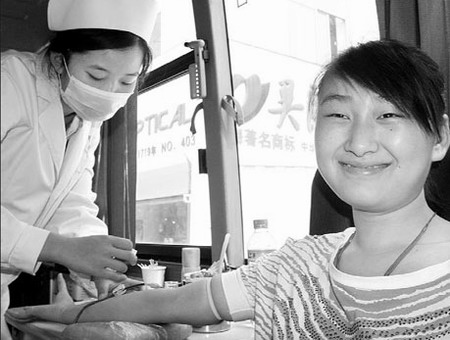Society
Voluntary donors praised for ensuring safe blood supply
By Yang Yijun (China Daily)
Updated: 2010-06-16 09:40
 |
Large Medium Small |
 A college student donates blood in a mobile clinic on Monday in Fuyang, Anhui province, in East China. [Dai Wenxue / For China Daily] |
Clinical blood is voluntarily donated in more than half the cities in China, Chen said, adding that the figures show the country has largely made the transition from planned to voluntary blood donations.
The theme of this year's World Blood Donor Day, New Blood for the World, highlights the contributions made by voluntary donors to public health and aims to encourage young people to donate blood to ensure a safe blood supply in the future.
The date June 14 was selected as World Blood Donor Day in 2004 by the World Health Organization (WHO) and three other organizations working for voluntary unpaid blood donation: the International Federation of Red Cross and Red Crescent Societies, the International Federation of Blood Donor Organizations and the International Society of Blood Transfusion.
On the same day, Chen disclosed China plans to assess the reform of the country's health service, which began last year, in the hope of providing safer, cheaper and more efficient health care to all Chinese people in both urban and rural areas.
Chen made the statement in Shanghai at the opening session of the WHO's annual meeting of the Joint Coordinating Board for a Special Program for Research and Training in Tropical Diseases.
He said the WHO will be invited to contribute to the reform of the health system, which is intended to guarantee every citizen access to basic health care.
According to Chen, China faces fresh challenges in preventing infectious diseases with the twin processes of rapid urbanization and an aging population.



